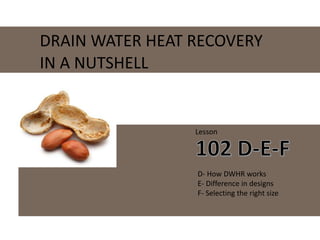Drain water heat recovery in a nutshell 102. How it works, different designs, residential size selection
- 1. DRAIN WATER HEAT RECOVERY IN A NUTSHELL Lesson D- How DWHR works E- Difference in designs F- Selecting the right size
- 2. The Process: Heat the incoming cold water with the heat energy from waste water. The Result: Less energy required to heat water and 3x more shower time Life expectancy: Thicker coil walls, larger coil diameter = longer life. 50+ years
- 3. All DWHR units should be safety and performance certified to CSA B55.2 and CSA B55.1 Factors that determines a good DWHR design 1) Length versus efficiency ŌĆō you should aim between 36 and 48 inches with a rating of 1% efficiency per inch. Example: 42 inches = 42% efficient 2) Pressure drop ŌĆō Anything below 4 psi rating is good. 3) Number of braze joints ŌĆō The more joints, the more potential problems with leakage. Avoiding brazed or soldered coil joints in design selection. A single ┬ŠŌĆØ coil design with no interruptions in cold water flow should be your first choice for a long trouble free unit. 4) Diameter and thickness of the coil walls ŌĆō Thicker walls means longer service life, larger diameter walls means less chance of blockage and reduction of performance over time.
- 4. Factor 1 ŌĆō What is the inside diameter of your drain pipe 3 or 4 inches. Note: 99% of the time you will have a 3 inch diameter pipe. Factor 2 ŌĆō Do you have any height restrictions? Call the manufacturer for help. Factor 3 ŌĆō Coil joint is ┬ŠŌĆØ if preheating to the hot water tank. Factor 4 ŌĆō What do you want as a payback period and return on investment. ŌĆō use DHWR course 101 and try the online calculators to help. Remember ŌĆō Unless comparing models from the same manufacturer, longer is not necessary better. Always compare length versus kW ratings. Example: Manufacturer A has a 58 inch long unit that has a lower kW rating than manufacturers BŌĆÖs 40 inch unit. Length = deception




